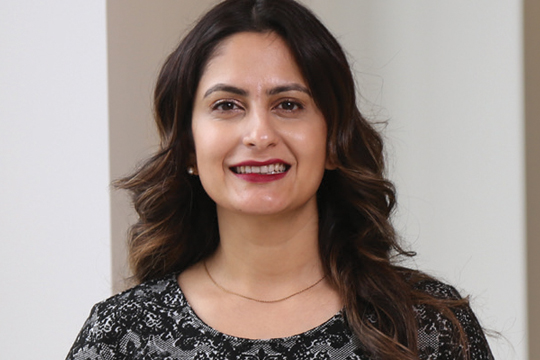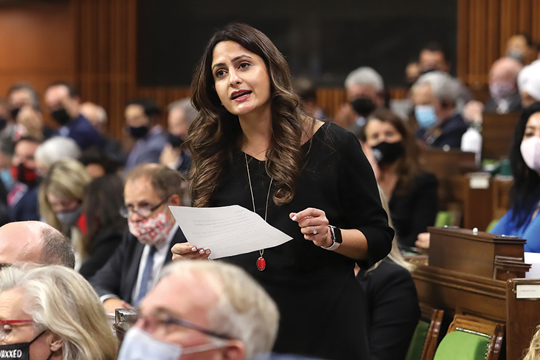
Among other promises to improve the lives of seniors, Kamal Khera says she won’t change the defined benefit structure of public sector pension plans.
She’s only 33 years old, but Seniors Minister Kamal Khera has more relevant experience in her new job as seniors minister than her age would suggest.
When she became minister of seniors in October 2021, the registered nurse-turned-politician knew what COVID was doing to the health-care system and some of the country’s long-term care homes first-hand. Khera had COVID in late March 2020 — the first MP to publicly announce she did — and as soon as she was free from isolation, she volunteered to work at a badly hit long-term care home in her riding of Brampton West.
“When this pandemic hit two years ago, there was a huge nursing shortage and the Registered Nursing Association of Ontario asked former nurses to sign up and prepare for the pandemic response,” Khera explains. “I put my hand up. I knew there was a long-term care home in Brampton that was one of the hardest hit. [It] prompted the Ontario government to request the Canadian Forces to assist. I was able to support them, bathe [the residents], feed them, give them their medication. It was challenging. It was a time when half the staff had tested positive and there were workers who were too afraid to come to work. You were left with a few health-care workers who were forced to make do.”
She recalls one particular nurse named Heather with whom she worked closely.
“She didn’t go home for two weeks and slept at the [long-term care] home because she said that if she left, there would be no one to care for them,” Khera says. “I often think of that in my new role as the minister of seniors.”
After her volunteer work, COVID affected Khera, who was first elected to Parliament in 2015 in the Liberal majority, in another way. Her father and a very close uncle died in quick succession. Both had had COVID previously, though it wasn’t what ended their lives. In December 2020, she decided to travel to the U.S. for a memorial service for both. The move, made when Canadians were asked to avoid all non-essential travel, cost her the position of parliamentary secretary to the minister of international development, from which she resigned, stating that she didn’t want to “distract from the important work of our government to continue battling this pandemic.”
This latest portfolio is a second chance for the young MP, who has handily beaten three different Conservative candidates in a row in the 2015, 2019 and 2021 elections.
C-12: Success No. 1
When it comes to the seniors portfolio, Bill C-12 is the first feather in Khera’s legislative cap. It received royal assent on March 3, 2022.
The bill originated with one of her first briefings after being newly elected in the autumn of 2021. It detailed the plight of seniors who took benefits during the pandemic, triggering a reduction or the elimination of their guaranteed income supplement (GIS.)
"We know of the huge challenges [these seniors] face and I wanted to make sure we do everything we can to compensate them and ensure that doesn’t happen again,” Khera says. “I worked really closely with our finance minister to put a significant amount of investment in the fiscal update to make sure we can fully compensate the seniors who took benefits in 2020 and had their GIS impacted.”
Bill C-12 ensures this won’t be a repeat issue, she says, and adds that it was thanks to good work by all parties that the bill made it through.
“It’s not often in politics that folks meet and get things done and this was one thing that we moved very quickly on,” she says, proud of the co-operation she received from colleagues from other parties.
Pension priorities
Asked whether, as the government looks to reduce spending in the post-COVID recovery, it will commit to keeping the sustainable, well-managed defined benefit pensions that are part of the compensation for federal public servants, Canadian Armed Forces (CAF) and RCMP members, Khera promised it will.
She says whether by saving lives on the front lines of long-term homes, delivering vaccines, rescuing Canadians from natural disasters or playing a role in the war in Ukraine, Canadians have been reminded of the CAF’s “crucial work” and she also commends the work of public servants and members of the RCMP.
“Our government remains committed to ensuring the long-term sustainability and affordability of the public sector pension plans and does not intend to change the defined benefit structure,” she says.
On broader pension questions, Khera notes that in their first parliamentary session, the Liberals rolled back the age of eligibility for Old Age Security (OAS) from 67 to 65. They also provided a one-time payment of $500 in August 2021 to pensioners who would be 75 or older by June 30, 2022, and increased the Guaranteed Income Supplement (GIS) by 10 per cent, stating that all seniors would see a bump of $500 for singles and $750 for couples starting at age 65, which they said would lift 45,000 seniors out of poverty. But plans to boost the OAS by 10 per cent were refined in 2021 to apply only to those who were 75 and older. They also would come into force only in 2022.
To opposition charges that the Liberals are thereby creating a two-tiered system by only upping OAS for those over 75, Khera says seniors’ financial needs increase as they age.
“They’re more likely to have a disability and to outlive their savings and that is why this summer we are going to increase OAS for those 75 and older,” she says. “Ensuring financial security has been a priority from our government since Day 1 and I commit to Canada’s seniors to make sure that we do more.”

Kamal Khera speaks in the House of Commons, where she successfully ushered through Bill C-12 early in her tenure as seniors minister.
Long-term care plans
The 2021 budget made commitments for one-time spending, including $3 billion for ensuring standards for long-term care are maintained and $90 million for an aging-at-home strategy.
Khera, who has also served as parliamentary secretary to the minister of health, says the pandemic showed the need for both. Age Well at Home provides funding for senior-serving organizations to offer practical supports such as meals, housekeeping or yard work for vulnerable seniors in their own communities, she says.
“I think this is a really neat initiative to mobilize these organizations and recognize the importance of seniors being able to age in their homes,” she says.
The pandemic showed many gaps in Canada’s system, perhaps none as important as the way in which the country treats its seniors who are in care. The nurse in her comes out as Khera talks about it.
“We’ve seen gaps exposed in infection and prevention control, staffing, infrastructure and visitation policies,” she says. “Throughout this pandemic, our government prioritized protecting the most vulnerable seniors in many ways. One way was by investing billions by procuring PPE [personal protective equipment] and continuing to work with the provinces and territories to ensure that long-term care homes had access to the protection they needed. Back in April 2020, when I was at the long-term care home, they didn’t even have the PPE for workers to do their jobs and keep them and the residents safe.”
In the spring, the two groups that are working on long-term care standards — the Health Standards Organization and the Canadian Standards Association — released their draft report and are now consulting the public on the standards.
“I really hope that Canadians from coast to coast to coast participate in that consultation period, because I think we need to hear from everyone whose lives have been touched,” she says.
Khera’s mandate letter specified that she should, with the support of the health minister, establish an expert panel to provide recommendations for establishing an Aging at Home Benefit. That’s still the plan, but it hasn’t happened yet.
Veterans issues
To address the issues faced by women veterans, Khera says Veterans Affairs Canada created the Office of Women and LGBTQ2+ Veterans, which will identify and work to address challenges facing these groups, regardless of their biological sex, gender identity, sexual orientation or other identity factors.
“There is much to be done, but we are committed to advancing services for women and LGBTQ2+ veterans based on their unique service-related needs,” says Khera, whose brother served with the Royal Canadian Air Force until recently.
In December, the Liberals issued an apology to CAF veterans and members who have suffered sexual harassment, assault or discrimination, and Khera says the Liberals are committed to “taking steps to do better.
“We’ll continue to undertake the critical work needed to earn and restore trust from those who have been impacted, strengthen accountability mechanisms and foster a safe and inclusive workplace.”
For families affected by the Marriage Over 60 clause, which specifies that veterans who remarry over the age of 60 can’t leave half their pension to their new spouse while those who marry before 60 can, the Liberals earmarked $150 million in 2015 to establish a Veterans’ Survivors Fund that would “work with the community” to identify impacted survivors and ensure they have the support they need. But updates have been sparse. Khera says Veterans Affairs Canada has been working with Statistics Canada to “examine the income and characteristics of these survivors and has contracted the Canadian Institute for Military and Veteran Health Research to consult with survivors to better understand the financial support they need, which will be used to inform next steps,” but she doesn’t have a timeline for this.
Kamal Khera on the issues
On the National Association of Federal Retirees’ role in her portfolio:
“The Association plays such a big role in advocating for seniors, and the issues they care about are fundamental to every single senior. We’ve had very good conversations about ensuring financial security and how [we will make] sure seniors are able to stay independently in their own communities and their own homes. The organization plays such a crucial role in advocating for those who have a voice and for the voiceless. I see the association as playing a huge role in the work that I do and will be doing.”
On how she’ll fight ageism:
“We are working to help communities become more age-friendly. I recently co-chaired the federal/provincial/territorial Ministers Responsible for Seniors Forum, which identified ageism as a priority. In addition, the National Seniors Council has examined issues related to the social isolation of seniors, the participation of older workers in the labour force, positive and active aging, volunteerism, low-income among seniors and elder and financial abuse.”
On pharmacare, which the NDP built into its agreement to keep the Liberals in power until 2025:
“The minister of health’s mandate letter explicitly calls for continuing to implement national universal pharmacare. In Budget 2022, I am excited to see dental care for Canadians, especially seniors. A third of Canadians do not have dental insurance, and in 2018, more than one in five Canadians reported avoiding dental care because of the cost. This past March, [we] announced a $2-billion top-up to the Canada Health Transfer to work towards eliminating the backlogs in surgeries and procedures and [to provide] the health care Canadians deserve.”

